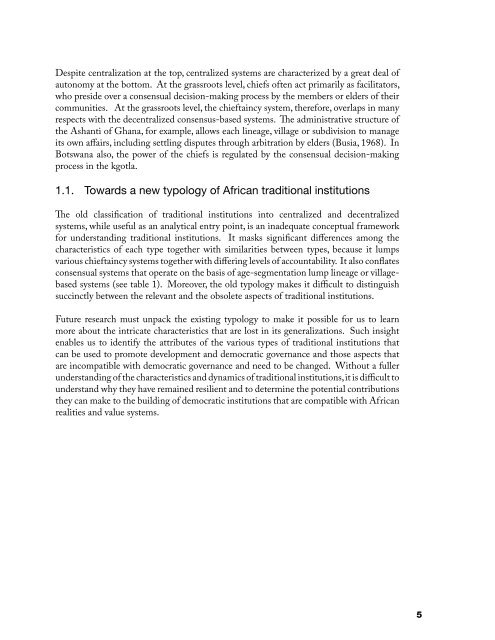Relevance of - United Nations Economic Commission for Africa
Relevance of - United Nations Economic Commission for Africa
Relevance of - United Nations Economic Commission for Africa
Create successful ePaper yourself
Turn your PDF publications into a flip-book with our unique Google optimized e-Paper software.
Despite centralization at the top, centralized systems are characterized by a great deal <strong>of</strong><br />
autonomy at the bottom. At the grassroots level, chiefs <strong>of</strong>ten act primarily as facilitators,<br />
who preside over a consensual decision-making process by the members or elders <strong>of</strong> their<br />
communities. At the grassroots level, the chieftaincy system, there<strong>for</strong>e, overlaps in many<br />
respects with the decentralized consensus-based systems. The administrative structure <strong>of</strong><br />
the Ashanti <strong>of</strong> Ghana, <strong>for</strong> example, allows each lineage, village or subdivision to manage<br />
its own affairs, including settling disputes through arbitration by elders (Busia, 1968). In<br />
Botswana also, the power <strong>of</strong> the chiefs is regulated by the consensual decision-making<br />
process in the kgotla.<br />
1.1. Towards a new typology <strong>of</strong> <strong>Africa</strong>n traditional institutions<br />
The old classification <strong>of</strong> traditional institutions into centralized and decentralized<br />
systems, while useful as an analytical entry point, is an inadequate conceptual framework<br />
<strong>for</strong> understanding traditional institutions. It masks significant differences among the<br />
characteristics <strong>of</strong> each type together with similarities between types, because it lumps<br />
various chieftaincy systems together with differing levels <strong>of</strong> accountability. It also conflates<br />
consensual systems that operate on the basis <strong>of</strong> age-segmentation lump lineage or villagebased<br />
systems (see table 1). Moreover, the old typology makes it difficult to distinguish<br />
succinctly between the relevant and the obsolete aspects <strong>of</strong> traditional institutions.<br />
Future research must unpack the existing typology to make it possible <strong>for</strong> us to learn<br />
more about the intricate characteristics that are lost in its generalizations. Such insight<br />
enables us to identify the attributes <strong>of</strong> the various types <strong>of</strong> traditional institutions that<br />
can be used to promote development and democratic governance and those aspects that<br />
are incompatible with democratic governance and need to be changed. Without a fuller<br />
understanding <strong>of</strong> the characteristics and dynamics <strong>of</strong> traditional institutions, it is difficult to<br />
understand why they have remained resilient and to determine the potential contributions<br />
they can make to the building <strong>of</strong> democratic institutions that are compatible with <strong>Africa</strong>n<br />
realities and value systems.
















